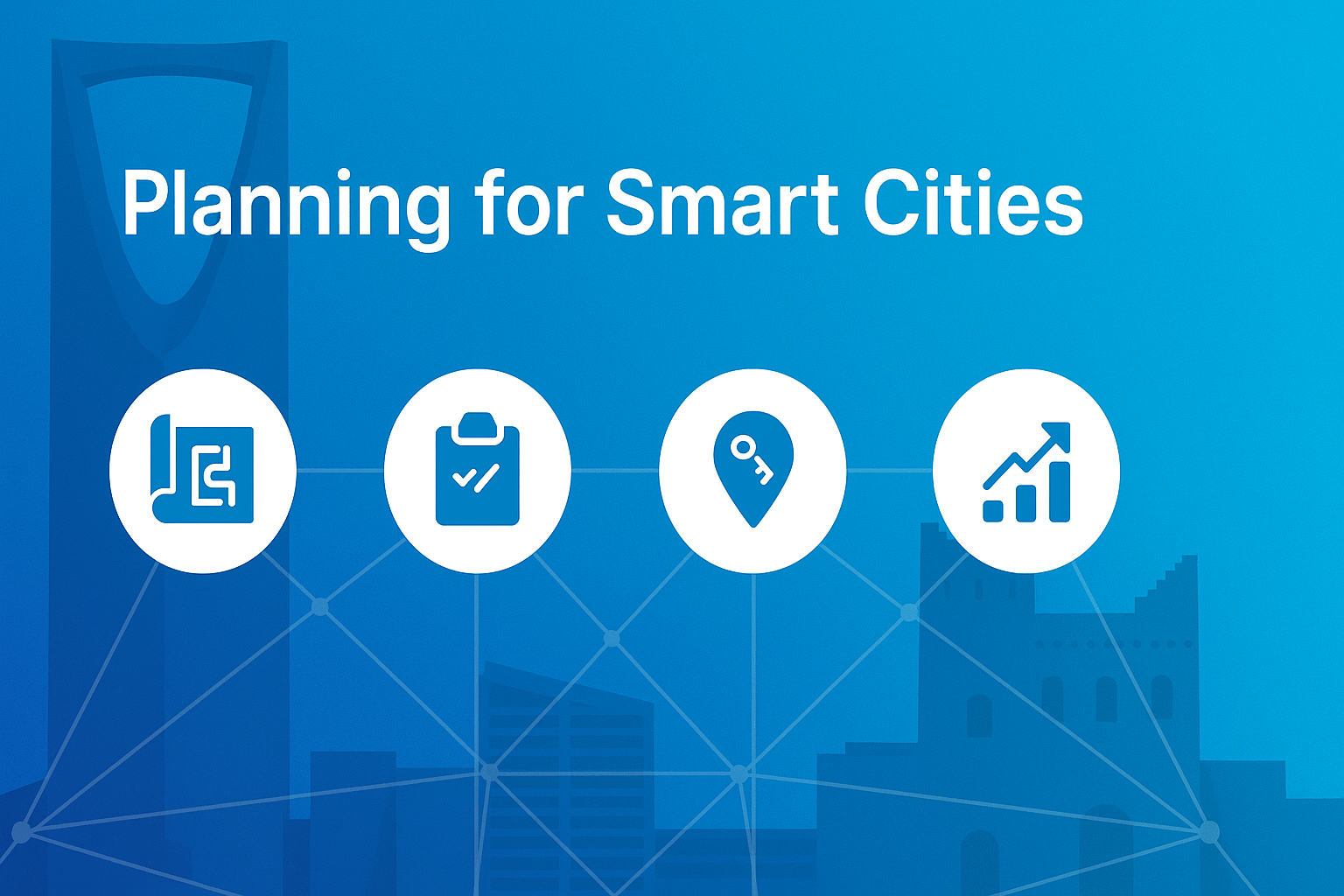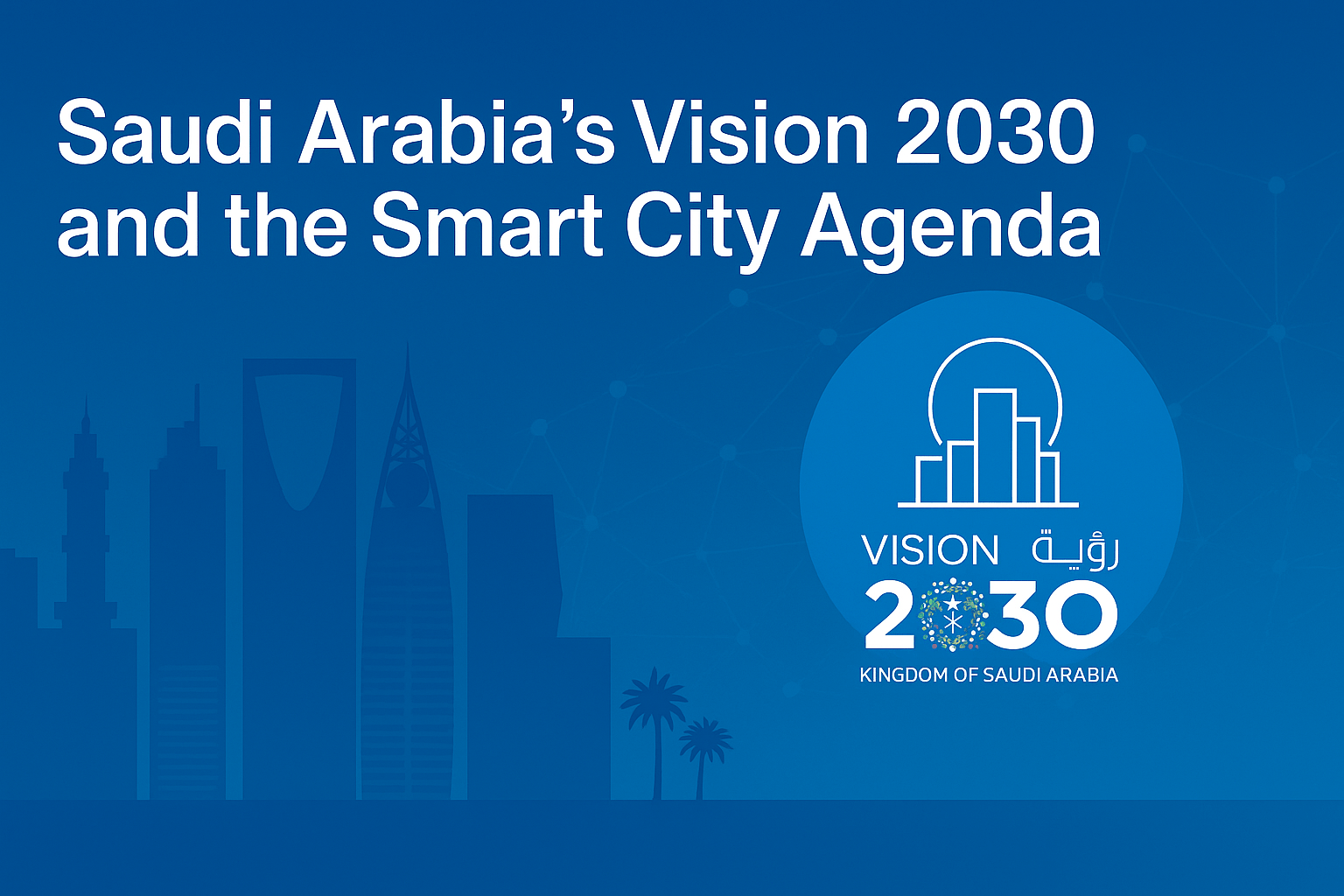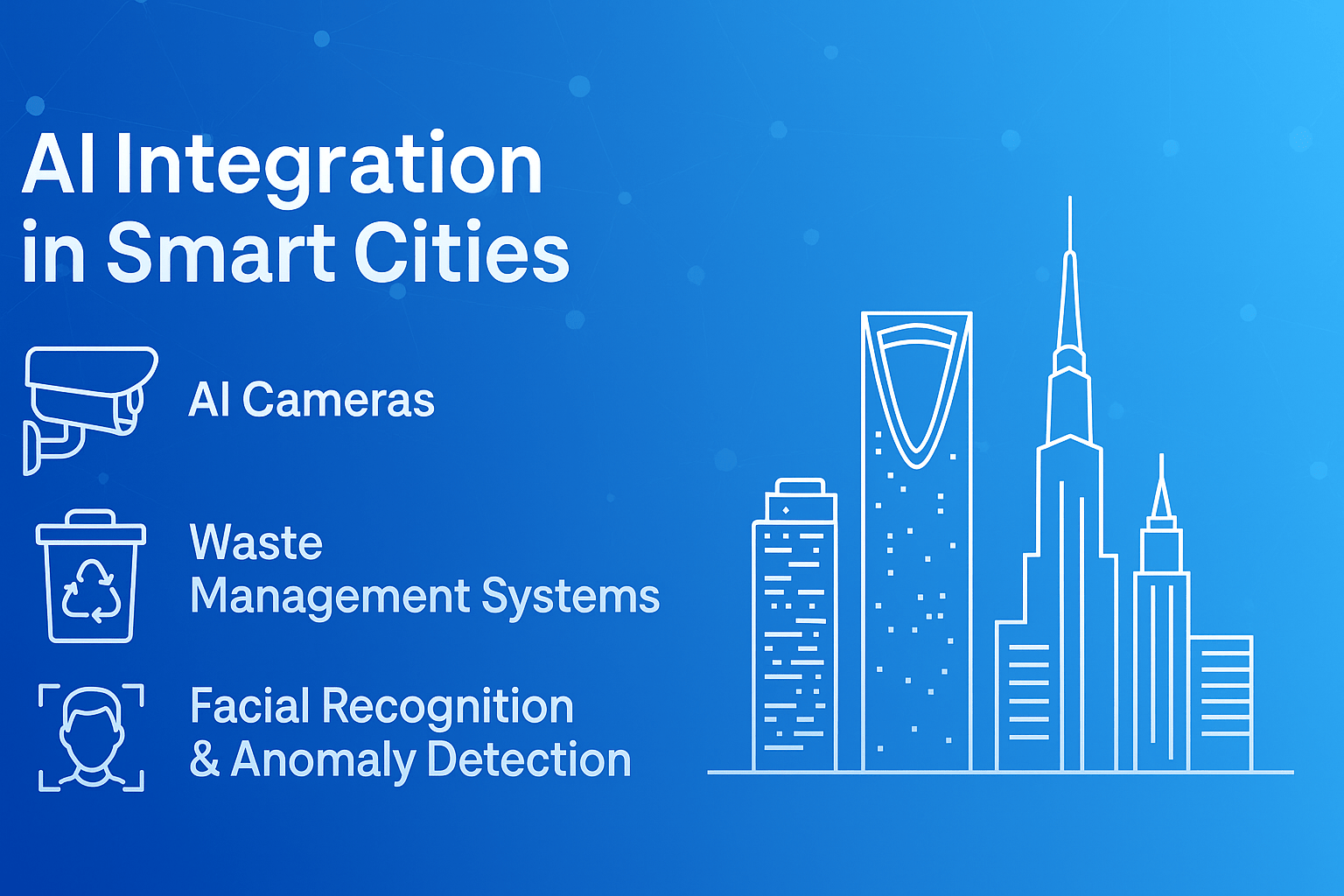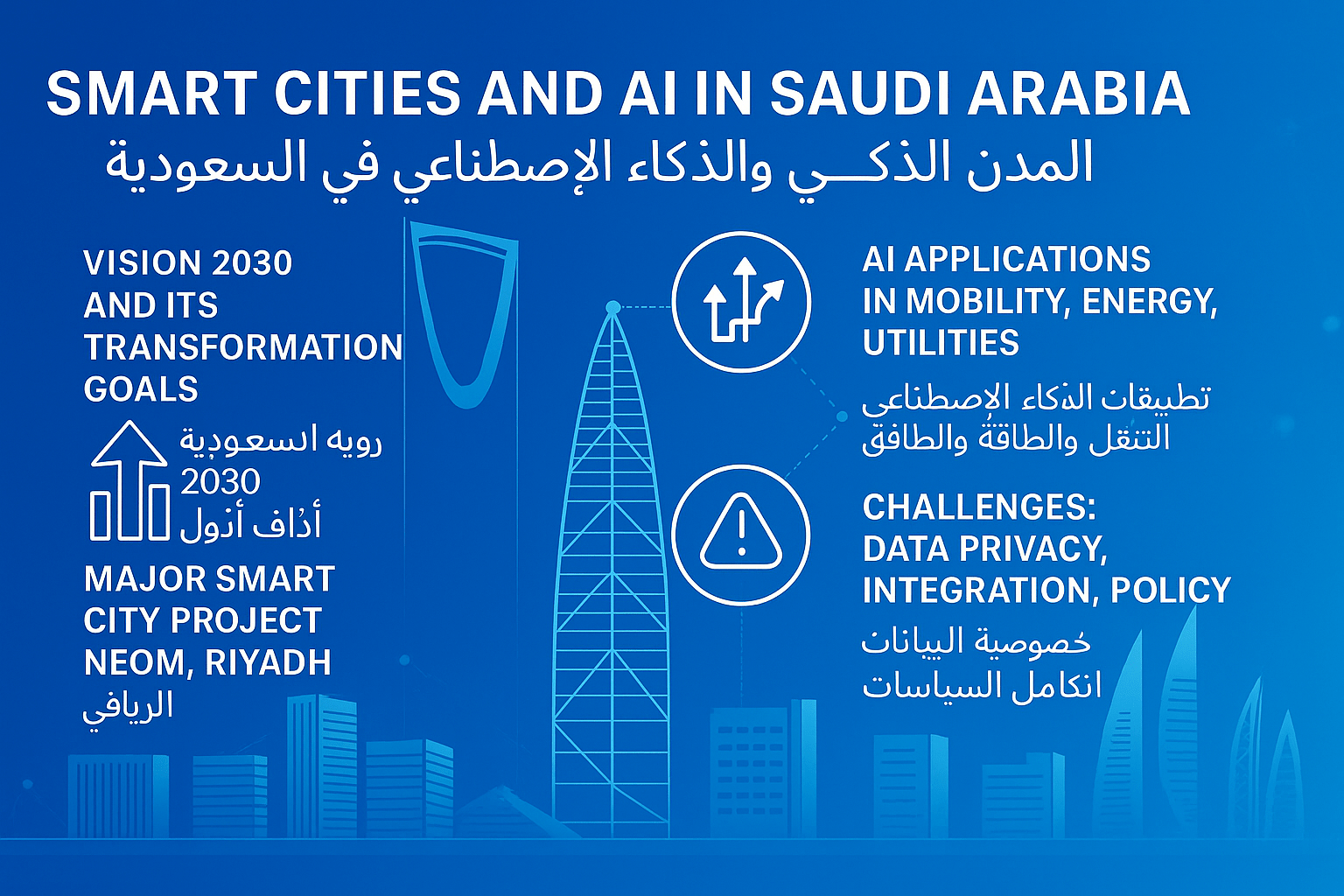Smart Cities and AI: Semantic Brains’ Contribution to Saudi Arabia’s Urban Transformation
Saudi Arabia’s urban landscape is evolving at an unprecedented pace, driven by the Kingdom’s ambitious Vision 2030 agenda. At the heart of this transformation is the rise of smart cities, urban areas that leverage cutting-edge technologies such as artificial intelligence (AI), the Internet of Things (IoT), and big data to enhance the quality of life for citizens, promote sustainability, and optimize municipal operations. Among the key players facilitating this evolution is Semantic Brains, a Saudi-based AI solutions provider contributing vital intelligence to the nation’s digital infrastructure.
This article explores how smart cities are redefining urban living in Saudi Arabia, the role of AI in enabling these intelligent environments, and how Semantic Brains is playing a pivotal part in shaping the Kingdom’s future.
Understanding Smart Cities

A smart city integrates digital technology into its core infrastructure, transportation, energy, waste management, governance, security, and citizen services. This integration creates a responsive, efficient, and sustainable ecosystem powered by real-time data. By utilizing AI, sensors, and advanced analytics, smart cities offer improved resource allocation, better decision-making, and more transparent governance.
Key features of smart cities include:
- Smart Mobility: AI-powered traffic systems, autonomous vehicles, and real-time route optimization.
- Sustainable Energy: Smart grids, renewable energy integration, and intelligent consumption monitoring.
- Digital Governance: E-services for licensing, citizen feedback, and public sector transparency.
- Connected Infrastructure: IoT-enabled buildings, surveillance systems, and utility management.
- Data-Driven Decision-Making: AI algorithms for urban planning, crisis response, and sustainability.
Globally, smart city benchmarks such as Singapore’s Smart Nation, Dubai’s Smart Dubai, and Barcelona’s smart city framework have demonstrated how integrated digital ecosystems drive economic development and environmental sustainability. Saudi Arabia is leveraging these global insights while tailoring its approach to align with its cultural, geographic, and economic realities.
Saudi Arabia’s Vision 2030 and the Smart City Agenda.

Saudi Arabia’s Vision 2030 blueprint prioritizes smart infrastructure development to diversify the economy and improve living standards. One of the flagship projects is NEOM, a $500 billion megacity being constructed along the Red Sea. Described as a living laboratory for urban innovation, NEOM will incorporate AI at every level, from autonomous public transportation to robot-assisted logistics and AI-governed waste management.
NEOM’s sub-project, The Line, is designed as a 170-kilometer linear city with no cars, no streets, and zero carbon emissions. All systems, transport, energy, water, and logistics will be managed through integrated AI platforms, creating a benchmark for cognitive urbanism.
Other cities such as Riyadh, Jeddah, and Dammam are undergoing digital upgrades to enhance traffic control, water distribution, and e-governance. The Ministry of Municipal and Rural Affairs and Housing (MoMRAH), in partnership with SDAIA (Saudi Data and Artificial Intelligence Authority), has introduced smart city standards to guide municipal AI integration.
The Role of Artificial Intelligence in Smart Cities AI is the backbone of smart cities, enabling systems to learn, adapt, and improve over time. Key AI applications include:
- Predictive Analytics: AI anticipates infrastructure maintenance, power demand, and water usage trends.
- Computer Vision: Used in surveillance, traffic monitoring, and waste sorting.
- Natural Language Processing (NLP): Powers chatbots for citizen inquiries and voice-command systems.
- Autonomous Control: For public transport, smart lighting, and emergency services.
- Urban Planning: AI helps simulate city growth, environmental impact, and infrastructure needs.
In Saudi Arabia, AI not only enables automation but also ensures resilience in city systems by creating redundancy, predicting system failures, and enabling adaptive responses to crises such as pandemics or natural disasters.
Semantic Brains: Catalyzing Urban Intelligence in KSA

Semantic Brains is playing a transformative role in Saudi Arabia’s urban digitization. By offering scalable, AI-driven platforms, the company helps municipalities and developers create smarter, safer, and more efficient cities.
1. AI Platforms for Urban Efficiency
Semantic Brains provides custom AI software that integrates data from disparate city systems—traffic control, energy grids, weather sensors, and citizen apps—into a unified dashboard. This real-time, holistic view enables city managers to make better-informed decisions.
Example contributions:
- Energy Optimization: AI-powered analytics that reduce wastage and improve utility service delivery.
- Mobility Intelligence: Real-time analysis of traffic patterns and smart rerouting algorithms.
- Waste Management Systems: AI-enhanced tracking and sorting mechanisms for recycling and disposal.
These platforms often employ federated learning, allowing the AI models to learn across decentralized data sources without compromising privacy. This technique aligns with national data governance mandates and builds trust among stakeholders.
2. Computer Vision for Urban Surveillance and Safety
Through advanced computer vision systems, Semantic Brains enhances public safety and infrastructure monitoring. These include:
- AI Cameras that detect overcrowding, suspicious behavior, and traffic violations.
- Facial Recognition & Anomaly Detection for public transport stations and government buildings.
Semantic Brains’ edge AI technology processes data locally to ensure rapid response times, crucial for applications such as automated incident alerts and dynamic traffic rerouting.
3. Citizen Engagement Through AI
Semantic Brains is also fostering digital inclusion by deploying AI chatbots and virtual assistants in municipal portals. These tools handle service requests, collect feedback, and provide multilingual support, ensuring 24/7 access to public services.
By integrating NLP engines tailored for Arabic dialects, Semantic Brains ensures that citizens of all educational backgrounds can effectively interact with digital government platforms.
Case Study: AI-Enabled Building Automation
In collaboration with real estate developers in Riyadh, Semantic Brains deployed an AI-based building management system that:
- Controls HVAC systems based on occupancy and climate conditions
- Monitors energy consumption to optimize electricity use
- Integrates with fire detection and elevator systems for smart maintenance
This initiative reduced operating costs by 20%, minimized energy waste, and improved resident satisfaction ratings, setting a precedent for AI retrofitting in existing urban infrastructure.
Semantic Brains and the NEOM Opportunity
With NEOM’s focus on AI-first city infrastructure, Semantic Brains is strategically positioned to contribute in:
- Cognitive city planning platforms
- AI for environmental sustainability and climate modeling
- Real-time urban simulation using digital twins
- Public transport automation and fleet intelligence
Semantic Brains is collaborating with NEOM innovation hubs to test AI prototypes, aligning their offerings with global smart city benchmarks while complying with Saudi regulatory frameworks.
Challenges and Mitigation.
While the potential is vast, urban AI integration faces several hurdles:
- Data Privacy: Semantic Brains implements federated learning and differential privacy techniques to maintain compliance with Saudi Data Law.
- Interoperability: Their modular AI systems use standardized APIs to interface with legacy infrastructure and smart city platforms.
- Workforce Readiness: Semantic Brains runs training programs and workshops in collaboration with local universities to upskill municipal employees in AI operations.
The Future of Urban AI in Saudi Arabia.
Looking ahead, AI will become deeply embedded into Saudi Arabia’s city life, from smart parking meters and voice-activated kiosks to AI-driven environmental monitoring stations. The Kingdom’s aim to have at least 10 smart cities by 2030 is well on track, thanks in part to tech pioneers like Semantic Brains.
Future trends include:
- AI-powered disaster response systems
- Decentralized AI governance models
- Carbon-neutral AI cities using green compute and quantum AI
- Behavioral analytics for proactive city planning
As AI becomes more democratized, Semantic Brains aims to offer AI-as-a-service (AIaaS) models to smaller municipalities, ensuring that smart city innovation is not limited to major urban hubs.
Conclusion:
As Saudi Arabia advances toward its Vision 2030 goals, the development of smart cities will be instrumental in fostering a vibrant, thriving, and ambitious nation. AI is the intelligence engine powering this transformation, and Semantic Brains stands at the forefront of this evolution. Through innovation, collaboration, and ethical tech deployment, Semantic Brains is not just supporting smart city development but helping to reimagine urban life in the Kingdom.
For municipalities, developers, and citizens alike, the smart city era is here, and Semantic Brains is helping to lead the way.


